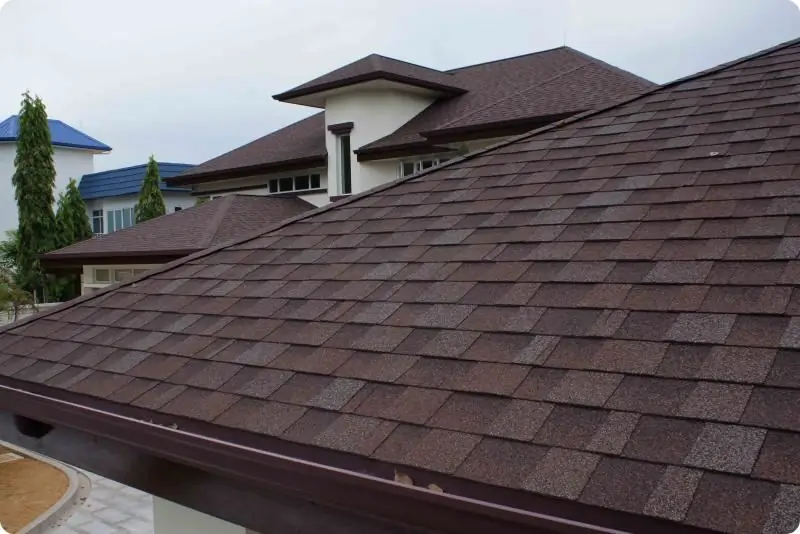
Table of contents:
- Author Bailey Albertson [email protected].
- Public 2023-12-17 12:53.
- Last modified 2025-06-01 07:32.
"Wet" case: dealing with a roof leak

Coziness in the house, among other things, is determined by the integrity of the roofing. If the roof leaks, wet spots, mold and fungus form in the room, comfort is out of the question. What to do in this case? Changing housing is not an option. It is much easier and faster to repair the roof. But before starting work, it is necessary to determine the place and cause of the leak, select materials, and then pay due attention to preventive measures.
Content
-
1 Why is the roof leaking
- 1.1 Exceeding the service life
- 1.2 Poor installation
-
1.3 Loss of tightness
1.3.1 Video: the causes of roof leaks
-
2 How to determine the place of roof leak
- 2.1 Inspection of the roof from the inside
-
2.2 Inspection of the roof from the outside
2.2.1 Video: how to find a leak on the roof
-
3 How to fix roof leaks
- 3.1 Materials for repairing roof leaks
-
3.2 Ways to eliminate leakage
- 3.2.1 Overhaul of the roof
- 3.2.2 Partial roofing repairs
- 3.2.3 Video: how to repair a slate roof with your own hands
- 4 Safety rules for roofing work
- 5 Preventing roof leaks
Why is the roof leaking
Roofing can leak for a variety of reasons. The most popular experts call:
-
exceeding the service life of the coating;

Old roofing Often the roof starts to leak due to the fact that the roof covering has exhausted its resource
- poor quality installation;
- violation of tightness where pipes, antennas lie, walls adjoin.
The roof covering can also become unusable due to mechanical damage
There is another classification by which the sources of roofing leaks are determined:
- rain (formed immediately after rain);
- snowy (show through when the snow begins to melt);
- dry (condensate);
- flickering (appear in different places and indicate that it is necessary to change the entire roof covering as a whole).
Let's deal with each type of damage in more detail.
Exceeding the service life
Any roof covering, even the most expensive, has a kind of warranty period. So, bitumen lasts about 15 years, slate - 20, metal tiles - about 30. If the roof has been used for more than 2-3 decades, it is likely that the material has become unusable for natural reasons. Due to constant temperature changes, precipitation and mechanical stress (cleaning), the roof is gradually thinning. The thickness decreases 2-3 times. In some places, small holes are formed, which are sometimes simply invisible to the human eye. But water easily seeps through them and causes a lot of inconvenience to homeowners.

All materials for the roof have their own expiration date, after which the coating becomes thinner, holes and cracks appear
Poor installation
Not always, but there are situations when specialists in roofing laying openly phony and do their job carelessly. The results of this careless attitude will be visible after the first rain. Sometimes careless craftsmen try to save money and use an insufficient amount of sealant or insulation. Because of this, condensation forms, which appears in the form of unpleasant wet spots on the ceiling.

Any roofing work can only be trusted by professionals with a proven track record
Leakage violation
In places where pipes are laid, antennas are installed and where walls are adjacent, the tightness is broken. In fact, a cavity appears between the roof and one of the above elements, inside which destructive condensation forms. Moisture accumulates, and then flows down, respectively, yellow or dark spots form on the ceiling. They spoil the overall aesthetics of the room and contribute to the formation of mold, mildew, and the growth of harmful bacteria.

Roof leaks most often appear at the junction of walls or at the junction of two slopes
Video: causes of roof leaks
How to determine where the roof is leaking
To understand the cause of a roof leak, you need to find its "weak" point. To do this, it is necessary to conduct a thorough and complete inspection of the roofing from the inside and outside. If we are talking about an apartment building, the inspection should be carried out by employees of the management company that is responsible for the building. If the building is private, then the direct owner should monitor its condition.
Inspection of the roof from the inside
In order to check the roof from the inside, you need to get into the attic or the attic. When looking for a leak, it is important to strictly follow the tips below so that the inspection is carried out with maximum benefit:
- Inspect only during daylight hours.
- Be sure to take at least two bright flashlights and one assistant with you, so it will be easier to find the place of leakage.
- Divide the roof visually into sectors and carefully check each of them, paying special attention to the floors, abutments, corners.
-
Spots of mold, mildew, or moss will indicate the problem. Sunlight will break through even a small hole, which is very difficult not to notice.

Finding roof leaks from the inside Leaks are clearly indicated by water drips, mold or moss spots
- Be sure to mark the discovered place with an indelible marker or paint.
Inspection of the roof from the outside
You need to climb on the roof only in dry, calm and warm weather. Then the procedure will be safe and successful.
When visually inspecting the outer surface of the roof, you need to be guided by the following principles:
- It is not worth starting an external examination if the internal one has not yet been performed.
- A light spot sometimes forms in the place of leakage, it is worth paying attention to this fact.
- The discovered hole should be marked with a marker, so that you do not look for it again for a long time and painfully.

When inspecting the roof externally, you need to take care of your personal safety, and it is better to do such work together
Video: how to find a leak on the roof
How to fix roof leaks
The place of leakage is found - this is half the success. Now the defect must be eliminated so that the further operation of the roofing does not cause any complaints. Repairs can be done in two ways:
- independently;
- with the involvement of third-party specialists.
The first option, although difficult, will help to save money. After all, craftsmen will take money not only for materials, but also for their time, which is sometimes very expensive. However, for those who are not versed in repair matters, it is better not to take on the reconstruction of the roof. The outcome may not live up to expectations.
To fix the problem yourself, you need to arm yourself with the necessary tools and materials and be patient. The reconstruction process is quite complex and very responsible.

Carrying out current roof repairs requires accuracy and minimal skills in carrying out construction work
Materials for repairing roof leaks
In order to correctly repair the roof, you need to know exactly what material it is made of, what is used as a heater and a waterproofing layer.
It should be remembered that during the repair it is necessary to replace not only the outer coating, but also all layers of the "roofing cake". Otherwise, the problem in the near future may again make itself felt.
Before proceeding with the reconstruction, prepare the following materials and tools:
- roof covering;
- insulation;
- waterproofing;
- sealant;
- polyurethane foam;
- construction scissors or saw;
- nails;
- paint and brush (if necessary, restore the uniformity of the color coating of the roof);
- crowbar or hook;
- a hammer.
Ways to eliminate leakage
Repairs can be major or partial.
Overhaul of the roof
For overhauls, follow the instructions below:
-
Remove the entire roof covering.

Dismantling the roof covering When carrying out a major overhaul, the old roof covering is removed completely
- Remove the waterproofing layer.
- The insulation is removed.
-
Check beams, floors and lathing for strength. If they require replacement or repair, they are corrected on the spot.

Roof slabs If the elements of the truss structure have become unusable, they need to be repaired or replaced
- The roof is covered with new insulation. As such, mineral or ecowool, expanded polystyrene, polystyrene or polyurethane foam can be used. These are relatively inexpensive, but popular and high-quality insulation.
-
Waterproofing is placed on top of the insulation. Usually, roofing material or a roll-up waterproofing coating is used for these purposes. Waterproofing is attached to the insulating surface with a stapler or nails. Sometimes polyurethane foam is placed between them for a reliable bond.

Installation of insulation on the roof Assemble the roof in the reverse order - first put insulation, then waterproofing and topcoat
- Next, the outer covering is laid. As such, bitumen, slate, metal roofing, corrugated board and many other materials can act. It is attached to the crate with nails or long self-tapping screws. The corners and joints with abutments are sealed and treated with polyurethane foam.
Partial roofing repair
Roof repairs are performed as follows:
-
Remove some of the outer roof covering. To do this, it is either cut out or removed with a hook and crowbar, depending on the material itself.

Partial dismantling of the roofing In places of damage, the roofing is dismantled so that the new fragment can be securely fixed
- Then part of the waterproofing is removed.
- The insulation is not removed. It is dried if it is too wet. This can be done with a hair dryer or naturally - leave the roof unassembled for a day, if the weather permits.
- A new one is put on the old insulation with a thin layer, while it is advisable not to mix different types of insulation coatings.
- Next, waterproofing is attached. The size of the patch should be at least 2 times larger than the area to be closed in order to prevent leaks.
- Then a surface coating is placed on the roof. In size, it exceeds the part to be embedded at least 2 times. Pay special attention to the mountings. To prevent moisture from getting to the insulation through self-tapping screws and nails, they are treated with a sealant.
-
If the roof is painted in a specific color, the renewed area should be painted to keep the patch out of sight.

Laying roofing After repairing the roofing pie, a new topcoat is laid on the damaged area and the roof is given its original appearance
If the hole or damage is small, then you do not need to remove part of the roof. The gap can be sealed with a sealant or cement mortar, but be sure to cover it with roofing material.
Exactly following all these rules, you can simply and quickly put the roof in order without spending too much money and effort. In this way, pitched and flat roofs can be repaired.
Overhaul of the roof is needed when there are too many small cracks, holes, holes on the roof. Making patches for this is too long and difficult. It is easier to change the entire roof entirely. Moreover, if its operational period has long expired or is coming to an end.
No assistants are required for partial repairs. It is quite possible to execute it alone. For a major reconstruction, it is advisable to invite at least one apprentice.
Video: how to repair a slate roof with your own hands
Safety rules for roofing work
Whatever the roof repair (partial or major), carrying out it, you should not forget about your own safety:
- since the work is carried out at a height, it is necessary to provide insurance against falls;
- reconstruction should be carried out in summer (if possible) with dry weather (required);
- restoration should be carried out only in specialized clothing, in stable boots or boots, protective gloves;
- if, after the repair, the roof still leaks, then the place of leakage was found incorrectly or there is another one. If independent searches have not been crowned with success, it is necessary to call on professionals for help;
- in the case when the floors are worn out or rotten, it is better not to climb onto the roof so as not to fall through;
- you do not need to take everything that is prepared for repairs with you to the roof at once. It will immediately be inconvenient to work with such an abundance of objects;
- we should not forget about the golden rule - you drive quieter, you will continue. Haste in this situation will only hurt;
-
If sealant or foam comes into contact with skin or eyes, wash off immediately with water and consult a doctor if necessary.

Safety precautions when performing roofing work When working on the roof, it is necessary to use safety devices and use comfortable clothes and shoes
Roof Leakage Prevention
A renovated roof needs careful maintenance in order for it to fulfill its "professional duties" as long as possible. Prevention of leakage is as follows:
- careful control and thorough inspection is necessary for every roof, without exception. You don't need to do it every day. Once every five to six months will be enough;
- if water accumulates on the roof during rain or snow, precipitation must be removed in a timely manner;
- do not allow birds to wind on the nest roof, this destroys the roof;
- if a very small hole is found, do not wait until it becomes large, it is necessary to carry out the restoration immediately, without putting it on the back burner;
- it is important to purchase certified materials for repairs. Product quality will largely determine the service life of the roofing sheet;
- nails and screws should be sealed so that moisture cannot penetrate inside to the insulation;
- it is necessary to promptly remove the appeared dirt and debris, to prevent accumulation;
- if possible, the roof must be painted, so additional protection appears in the form of a thin film of dye;
- residents of the northern regions are advised to insulate the roof in 2-3 layers. Then condensation will not appear.
A roof leak is not the end of the world and is not a reason to urgently look for a new place of residence. The roof can be repaired. Major or partial repairs are in progress. You need to use only high-quality certified materials for which the seller has a license. The better the materials, the longer they will serve their owner. You should contact the professionals if the do-it-yourself repairs did not help or you cannot do it yourself for any reason.
Recommended:
How To Get Rid Of Humidity And Dampness In An Apartment Or House, As Well As From The Accompanying Smell, How To Eliminate It And Useful Tips

Dampness and fungus in an apartment and a private house. The reasons for the appearance of excessive moisture, condensation, mold and how to eliminate them. Preventive measures. Instructions
How To Quickly Peel Squids, Including Frozen Ones, And Quickly Get Rid Of The Film + Photos And Videos

Do you think peeling squid is a difficult and energy consuming task? We will dissuade you of this
How To Distinguish A Cat From A Cat And Determine The Sex Of A Kitten: How To Distinguish Between Boys And Girls At A Young And Adult Age, Photo

When a kitten's gender is formed. Rules for examining a newborn kitten. Methods for determining the sex of a feline. Differences that increase with age
Containers And Bowls For Dry And Wet Cat Food: Varieties, How To Choose, What To Look For, Where To Place And How To Care

What kind of dishes does the cat need; types of bowls and auxiliary items for feeding a cat, how best to choose a bowl, how to care for a cat's dishes
Roofing Cake For A Soft Roof, As Well As The Features Of Its Structure And Installation, Depending On The Type Of Roof And The Purpose Of The Room

What is a cake under a soft roof. Features of its device and installation. How to arrange a roofing cake from roll and piece materials
